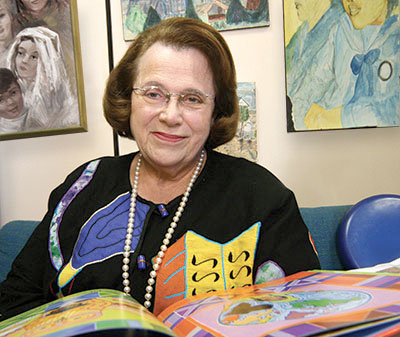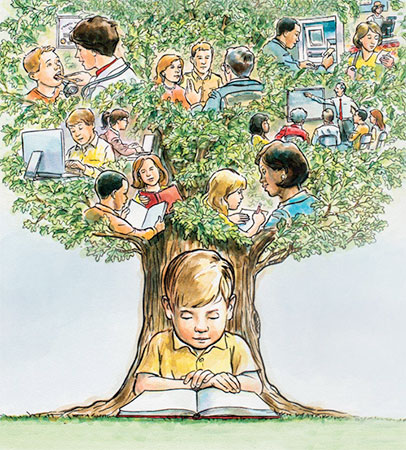Written by: Nancy Mann Jackson
Need more info? Contact us
 Maryann ManningWhat does a warm coat have to do with reading and writing? Maryann Manning, Ed.D., saw the connection. The internationally renowned author and scholar on literacy issues, a distinguished professor emerita at UAB’s School of Education, “provided eyeglasses, coats, and shoes to children in the area because she understood that kids can’t do the things they need to do in school when they’re cold on the way to school,” says her daughter, Marilee Ransom, Ph.D. “My mother understood that unless we take care of families and their basic needs, we can’t expect children to be able to perform.”
Maryann ManningWhat does a warm coat have to do with reading and writing? Maryann Manning, Ed.D., saw the connection. The internationally renowned author and scholar on literacy issues, a distinguished professor emerita at UAB’s School of Education, “provided eyeglasses, coats, and shoes to children in the area because she understood that kids can’t do the things they need to do in school when they’re cold on the way to school,” says her daughter, Marilee Ransom, Ph.D. “My mother understood that unless we take care of families and their basic needs, we can’t expect children to be able to perform.”
That comprehensive approach has inspired the creation of the new Maryann Manning Family Literacy Center at UAB. The center continues the work of Manning, who died in 2013 after 35 years on UAB’s faculty. But it also takes literacy to new levels, involving areas ranging from health care to math, technology, and finance. “The center and its leaders are aligned with my mom’s ideas that work with broad policy issues that can help improve literacy,” Ransom says. “But they’re also looking at issues facing individual children and families, working to improve every kid’s life, one at a time.”
Paying the costs
Despite a long history of literacy education, illiteracy remains a problem in Alabama. With a growing population of non-native English speakers, determining an accurate illiteracy rate can be difficult. The National Center for Educational Statistics reports that 15 percent of Alabamians are functionally illiterate; however, the Literacy Council of West Alabama estimates that rate at one in four Alabamians. Functional literacy includes basic skills such as reading, writing, technological capabilities, and mathematical computation.
Whichever number is correct, the prevalence of illiteracy imposes real costs on individuals, families, and society. Low literacy levels translate into increased high school dropout rates; higher rates of social problems such as crime, teen pregnancy, poverty, and substance abuse; higher medical costs, including mental health costs; and a lower-performing workforce, says Lynn Kirkland, Ed.D., chair of UAB’s Department of Curriculum and Instruction.
 “Literacy permeates every aspect of our lives,” adds Fran Perkins, Ph.D., interim director of the Manning Family Literacy Center and associate professor of curriculum and instruction. “The inability to read and write impacts earning power and unemployment.” Functional literacy, she explains, also includes skills required to participate fully in society. To build good health and stay healthy, for example, people need to read medication instructions and information about accessing health care or public services. To operate successfully in a digital world, people need access to technology and the ability to use it correctly, as well as research and analytical skills. “There is a great deal of misinformation online, and students need skills to determine what is and isn’t credible,” Perkins says.
“Literacy permeates every aspect of our lives,” adds Fran Perkins, Ph.D., interim director of the Manning Family Literacy Center and associate professor of curriculum and instruction. “The inability to read and write impacts earning power and unemployment.” Functional literacy, she explains, also includes skills required to participate fully in society. To build good health and stay healthy, for example, people need to read medication instructions and information about accessing health care or public services. To operate successfully in a digital world, people need access to technology and the ability to use it correctly, as well as research and analytical skills. “There is a great deal of misinformation online, and students need skills to determine what is and isn’t credible,” Perkins says.
“Most importantly, illiterate parents are challenged to provide their children with the help they need to lead literate lives,” Perkins says. And the effects of illiteracy can linger.
“Children’s achievement in schools is directly related to their families’ literacy and educational levels,” Kirkland says.
Personal and relevant
At its core, UAB’s new family literacy center will provide one-on-one assessment and instruction for children, particularly those living in low-income areas; create opportunities to bring children and books together; and offer professional development for teachers. Some pieces are already in place at the School of Education: The Children’s Creative Learning Center provides summer enrichment in reading, writing, math, arts, and science; the Young Authors’ Conference connects schoolchildren with writers and books; and the Innovative Learning Collaborative brings together the knowledge and skills of UAB and Birmingham City Schools faculty. In addition, the Mid-South Reading/Writing Institute promotes innovative classroom teaching strategies, and the Red Mountain Writing Project, a partnership with the National Writing Project, helps teachers foster literacy skills—with an emphasis on the arts and humanities—among middle-school students. Manning initiated many of these programs, which have supported literacy education for decades.
To that list, the center will add a literacy learning clinic to tutor children in the community, a reading assessment clinic, and a family literacy program to meet the needs of Alabama’s culturally diverse population. Each program captures Manning’s spirit and commitment to brighten lives through literacy, Perkins says.
Manning spent “much of her professional life, and often personal resources, creating more literate lives for children and their families,” Perkins says. “She was especially committed to bringing meaningful literacy experiences to families living in poverty. Manning recognized that families contribute significantly to children’s literacy development. However, such knowledge is often overlooked and replaced with scripted reading programs that falsely promise to cure all literacy ills. Her approach to learning with teachers was much more organic; that is, personal and relevant.”
While the center’s initiatives target students, educators, and families in the community, UAB education students will benefit as well. “Students enrolled in literacy methods classes will work with literacy faculty and area reading coaches to observe and collaborate on effective literacy intervention practices with struggling readers,” Kirkland says. She also hopes to involve students in research projects and publications, including a new online professional research and practice publication, the MidSouth Literacy Journal. Additional projects and goals will be announced as funding becomes available, Kirkland says.
Better health for literacy
Though the center is housed in the School of Education, it takes an interdisciplinary approach beyond reading and writing instruction. “Literacy, for Manning, is not limited to knowledge and experiences in a school setting,” Perkins says. “Creating literate lives requires the entire community, in-school and out-of-school support.”
For example, the center will provide services to help develop healthy families, inspired by research showing that children in those environments reach high levels of academic achievement. Many services will come through UAB partnerships. With the School of Dentistry, the center might offer dental care to children and families in need; other collaborations could include the schools of Medicine and Public Health.
“We use the term ‘literacy’ in a broad sense because families need wraparound services that are accessible and dependable,” Kirkland says. “We will provide a centricity of services so that families know they will be available as needed.”
Read more from UAB Magazine.
